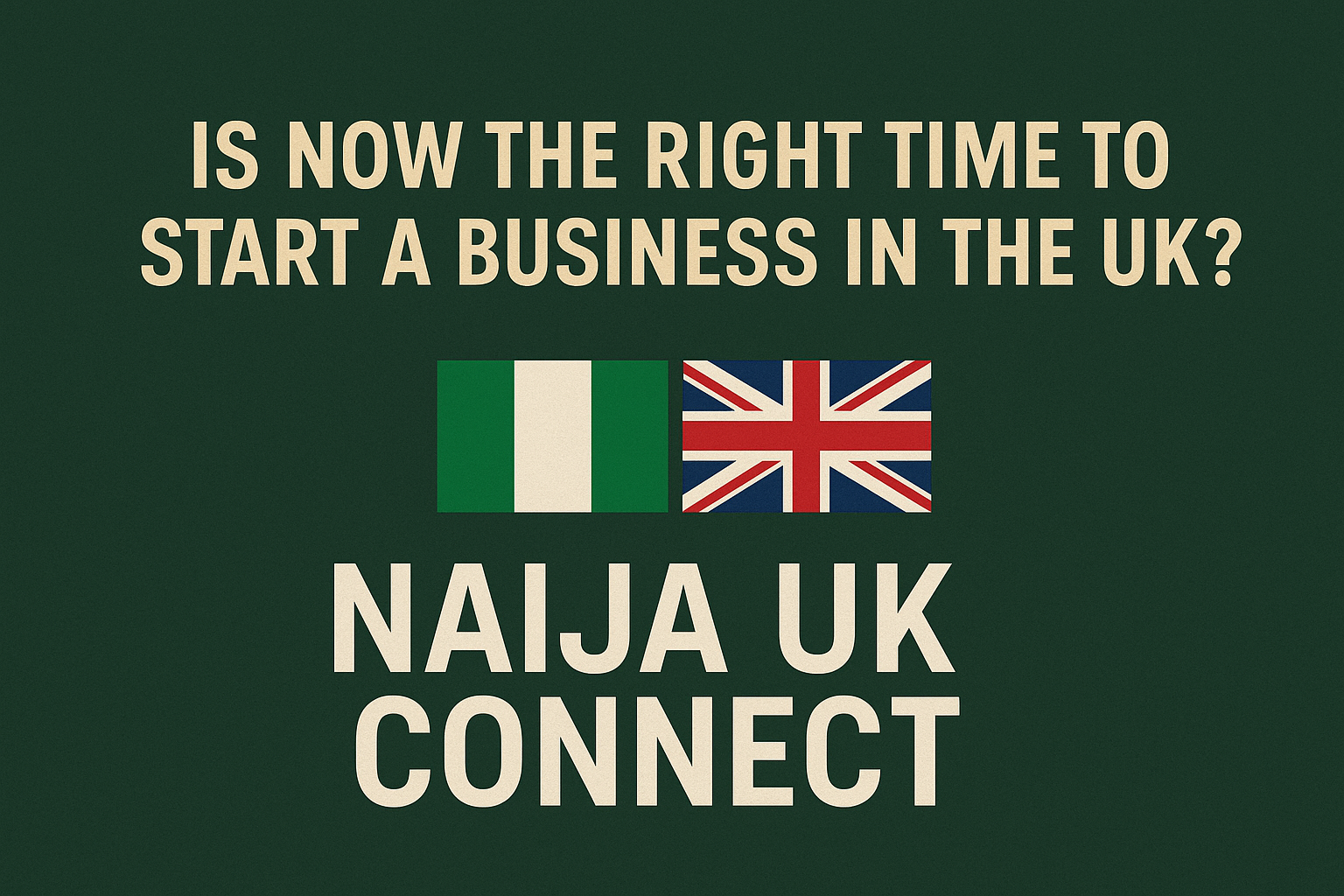Starting a business in the UK is a dream for many Nigerians living here. But with new immigration rules on the horizon, you might be wondering:
“Should I risk investing money and effort when the rules might change?”
At Naija UK Connect, we’re here to walk you through everything you need to know — from setting up your business, understanding the self-sponsorship route, to navigating proposed visa changes. Let’s break it down step-by-step.
1. Understanding Self-Sponsorship: What Is It?
Self-sponsorship is a pathway under the UK Skilled Worker visa system where you, as a business owner, sponsor yourself to work legally in the UK through your own company.
Unlike the usual route where an employer sponsors you, here your own business acts as the sponsor — issuing you a Certificate of Sponsorship (CoS), which is essential for your Skilled Worker visa application.
2. Can I Start Any Business and Sponsor Myself?
The good news is the UK Home Office does not impose a fixed turnover or capital amount you must have to qualify for self-sponsorship. However, some key points are:
- Your business must be genuine and actively trading — it can’t just be a shell company.
- You must be able to pay yourself a salary at or above the required threshold.
- The business must have enough funds to sustain operations — covering expenses, taxes, and your salary.
For example, if you’re running a Nigerian or African food business, you might sponsor yourself in roles such as Chef, Catering Manager, Kitchen Manager, or Floor Manager.
3. What Salary Do I Need to Pay Myself?
Even if your role’s typical salary threshold is lower, the Home Office sets a general minimum salary for Skilled Worker visas.
- The current minimum salary requirement is £38,700 per year (before tax).
- This means your business should be generating sufficient revenue to cover this salary plus business costs.
Your ability to pay yourself this salary is crucial — it proves to the Home Office that your business is sustainable and that you are not working illegally.
4. The Process: From Setting Up Your Business to Getting Your Visa
Step 1: Register Your Business
Make sure your company is legally registered with Companies House and has a UK business bank account.
Step 2: Apply for a Sponsor Licence
Your company must apply to become a licensed sponsor. This involves providing evidence of business activities, financial stability, and HR systems for compliance.
Step 3: Assign a Certificate of Sponsorship (CoS)
Once your sponsor licence is approved, your company can issue you a CoS — an electronic document confirming you are sponsored for a Skilled Worker visa.
Step 4: Apply for the Skilled Worker Visa
Using the CoS, you apply for the Skilled Worker visa. This visa allows you to live and work legally in the UK for your own company.
5. What About the Proposed Immigration Rule Changes?
The UK government has announced proposals that could affect Skilled Worker visa requirements in the future:
- Higher skill level required: Jobs may need to meet RQF Level 6 (equivalent to a UK degree) instead of the current RQF Level 3 (A-Level).
- Higher English proficiency: The required English language level might increase from B1 (intermediate) to B2 (upper-intermediate).
Important: These are only proposals at this stage. No official dates or guarantees have been announced.
So don’t panic or delay your plans just yet — keep an eye on updates and plan accordingly.
6. Is This the Right Time to Start?
With all these moving parts, you might be asking:
“Should I start my business and self-sponsorship journey now, or wait?”
Here’s the bottom line:
- The best time to start is when you’re ready and fully prepared — with a solid business plan, enough funding, and understanding of the visa process.
- Don’t let fear of future rule changes stop you from pursuing your dream.
- Stay informed by following official updates and seeking advice from immigration experts.
7. Practical Tips for Nigerian Entrepreneurs in the UK
- Keep detailed financial records: Show clear evidence your business is active and profitable.
- Build a strong business case: Demonstrate your role is genuine and necessary.
- Get professional advice: Immigration lawyers and business consultants can help you navigate sponsorship and visa complexities.
- Network with fellow Nigerian entrepreneurs: Learn from others who have successfully sponsored themselves.
Final Thoughts
Self-sponsorship in the UK offers a powerful opportunity for Nigerians who want to run their own businesses and work legally under the Skilled Worker visa. It requires planning, funding, and commitment — but it’s achievable.
Stay informed, stay prepared, and don’t hesitate to reach out to Naija UK Connect for guidance and support.
Ready to start your UK business journey?
Follow us for updates, tips, and real-life stories from Nigerians making it work here in the UK! 🇳🇬❤️🇬🇧
Great! Here’s a detailed Checklist and FAQ section to complement the article and provide clear practical guidance for Nigerians planning self-sponsorship in the UK:
Self-Sponsorship in the UK: Essential Checklist for Nigerian Entrepreneurs ✅
Before You Start:
- Business Idea & Plan: Define your business type, target market, and operational plan.
- Company Registration: Register your business with Companies House and get a UK business bank account.
- Funding: Secure enough capital to cover initial costs and pay yourself the required salary (£38,700+ per year).
- Legal & Tax Compliance: Understand your tax obligations and register for VAT if necessary.
Sponsor Licence Application:
- Prepare documents proving your business is genuine and operational (financial records, invoices, contracts).
- Set up HR and payroll systems to meet sponsor licence requirements.
- Apply for your company’s sponsor licence with the UK Home Office.
Sponsorship & Visa Application:
- Once approved, assign a Certificate of Sponsorship (CoS) to yourself through your company.
- Prepare and submit your Skilled Worker visa application with the CoS.
- Meet English language and maintenance (funds) requirements for the visa application.
Ongoing Business Operations:
- Maintain accurate and up-to-date financial records.
- Pay yourself the minimum salary required and meet other visa conditions.
- Stay informed about UK immigration updates and comply with Home Office rules.
Frequently Asked Questions (FAQ) for Nigerian Entrepreneurs on Self-Sponsorship
Q1: How much money do I need to show for my visa application?
You need to demonstrate that your business can pay you a minimum salary of £38,700 per year. Additionally, you must show you have enough funds to support yourself during the visa application process (usually around £1,270 in your personal account for 28 days).
Q2: Is there a minimum turnover or capital required to start?
No fixed turnover or capital is required by the Home Office. The key is that your business is genuine, active, and financially stable enough to run and pay your salary.
Q3: Can I sponsor myself for any business role?
You must sponsor yourself in a role that meets Skilled Worker visa criteria and appears genuine in your business. Common roles in food businesses include Chef, Catering Manager, or Floor Manager.
Q4: What happens if the new immigration rules come into effect?
If higher skill levels and English proficiency requirements apply, you may need to show higher qualifications (degree-level) and better English skills. Keep up to date and prepare by improving your skills if needed.
Q5: Can I start the visa application process before getting a sponsor licence?
No, your company must have an approved sponsor licence and must issue you a Certificate of Sponsorship before you can apply for the visa.
Q6: How long does the sponsor licence application take?
Typically, it takes 8 to 12 weeks, but this can vary depending on the Home Office workload and your application completeness.
Q7: What if I don’t meet the salary requirement immediately?
Your business needs to be sustainable enough to pay the salary. You might need to delay your visa application until your business income supports this.
Join Our WhatsApp Channel
Stay updated on the latest UK news, including education, health, job openings, and more for those living in the UK!
Join here: Naija UK Channel
Also, follow us on our social media channels for the latest updates and discussions:
- Twitter: @NaijaUKConnect
- Facebook: Naija UK Connect
- Instagram: @naijaukconnect




